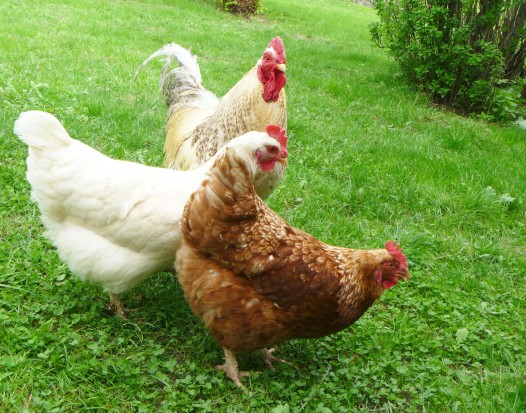

Keeping chickens is fun and has become extremely popular over recent times. However, if you are considering having a few chickens in your back garden so you get lovely fresh eggs, you need to do a little research first to make sure you would be allowed to do so. You also need to read up on the sort of diseases and illnesses to watch out for, some of which must be reported to the authorities should your birds have the misfortune of contracting one of them – these are called "notifiable diseases" which must be reported to DARDni (Department of Agriculture and Rural Development).
If you are hoping to have fresh eggs every day, three hens would be enough to keep in a back garden and you happily with a constant supply of eggs. However, hens normally stop laying when the winter sets in unless you provide them with a heat lamp and artificial light in their hen house that is. A healthy, happy hen will lay one egg every day so you have to make sure you don't end up with too many in which case you may consider selling a few of them.
If you find you have a lot of extra eggs, you can sell them but there are regulations which you need to know about which includes the following:
However, if you have more than 50 hens in your flock or you sell them to a person who intends on selling them on to other people namely a shopkeeper, a bakery or other, then you would need to be registered with DARD's Egg Marketing Inspectorate. Failing to be registered could land you in trouble with the authorities.
Everyone who keeps chickens (and other poultry) has to register their birds with DARD and this applies to anyone who only looks after poultry for a certain part of the year. It's very easy to register your chickens which you can do online. It's also a good idea to get in touch with your local vet to make sure they are willing to treat your birds if they fall sick or contract any kind of nasty disease.
In Northern Ireland there are some infections which may cause health issues to people which includes the following:
However, there are other conditions which chickens suffer from which are considered very serious although not notifiable which are as follows:
Less common conditions but which are just as devastating to chickens should they contract them include the following:
Both of these diseases are notifiable which means you would need to contact the authorities as soon as you suspect your chickens might be showing any symptoms of either of them and you have to do this immediately!
With so many people now keeping chickens as pets in their back gardens whether their birds are more pets than anything else, you need to know the hens you buy come from a good source and are therefore healthy. If you already have a few chickens and would like to introduce a few more into your flock, you have to know the new hens are healthy so that no unwanted parasites or diseases affect the birds you already own.
It's possible to find chickens from many different sources and they can be as young as a few days old. However, the younger the chick is, the harder it is to look after them. Then you have to consider set up costs because you would need to invest in a lot more equipment – namely a brooder which boasts a heat lamp. If you are a first time chicken owner, it is far easier to buy chickens which are around 4 to 5 months old which are called "point of lay hens" due to the fact they are just about to start laying eggs.
Consider buying your chickens from a local breeder or farm and the best place to start your search is either online via our Pets4Homes poultry for sale section or by looking through a few local farming newspapers or magazines.
When you go to look at any chickens, there are things about the birds that will give you a good idea if they are healthy birds or not. The things to look at are as follows:
If you are a first time chicken owner, it would be better to buy a few healthy hens before you offer a home to ex-battery hens. The reason being the majority of these poor birds have lived pretty harsh lives up until the day they are re-homed and as such are often in extremely poor condition with very few feathers and damaged beaks. It can be quite hard getting these lovely birds back in condition and heartbreaking when they don't make it and die.
It is far wiser to wait and when you have a little more experience under your belt, then you can decide to offer battery hens a caring, loving home and a second chance at living out their days as they should – rummaging around in the dirt as chickens should!
Keeping chickens is lovely because each and every one of them have their own personalities. However, just as with any other animal, you have to take good care of your hens making sure they stay healthy and happy throughout the year. You also need to register your chickens with DARD and if you suspect any of them may be suffering from a notifiable disease, you would need to inform the authorities straight away because these diseases are extremely serious and could affect all poultry in the country should the disease be allowed to spread.
 Top 4 Health Issues That Affect Cats
Top 4 Health Issu
Top 4 Health Issues That Affect Cats
Top 4 Health Issu
 Why Use Self-Serve Dog Wash?
Why Use Self-Serve Dog Wash?
If you are a dog
Why Use Self-Serve Dog Wash?
Why Use Self-Serve Dog Wash?
If you are a dog
 Should You Be Concerned About Tumours And Your Aging Dog?
Should You Be Con
Should You Be Concerned About Tumours And Your Aging Dog?
Should You Be Con
 Effective Vermin Control in Milton Keynes is only by an Expert
Effective Vermin Control in Milton Keynes is only by an Ex
Effective Vermin Control in Milton Keynes is only by an Expert
Effective Vermin Control in Milton Keynes is only by an Ex
 Complete Medical care of pet at Veterinary Clinics in Coquitlam
Complete Medical care of pet at Veterinary Clinics in Coqu
Complete Medical care of pet at Veterinary Clinics in Coquitlam
Complete Medical care of pet at Veterinary Clinics in Coqu
Copyright © 2005-2016 Pet Information All Rights Reserved
Contact us: www162date@outlook.com